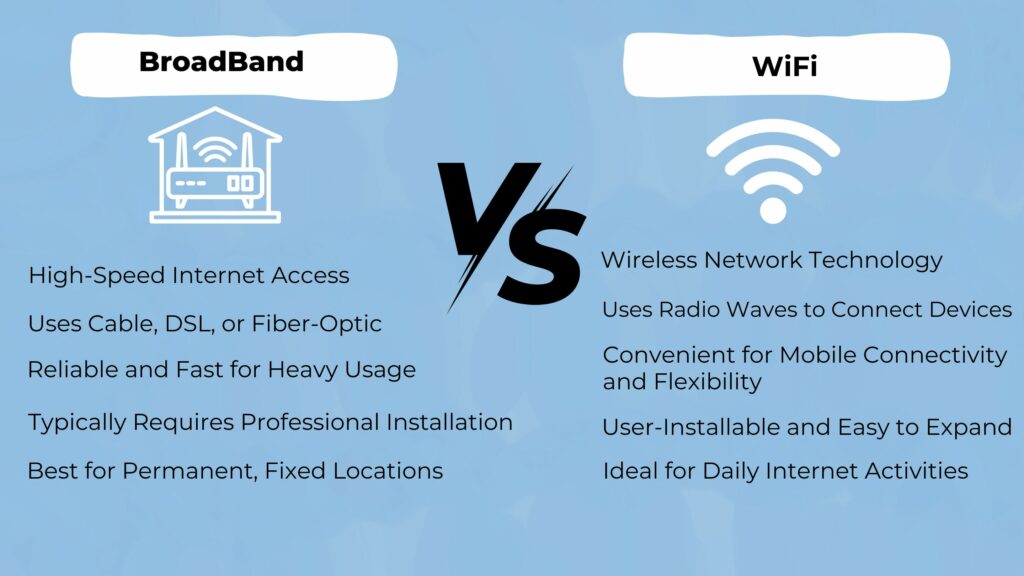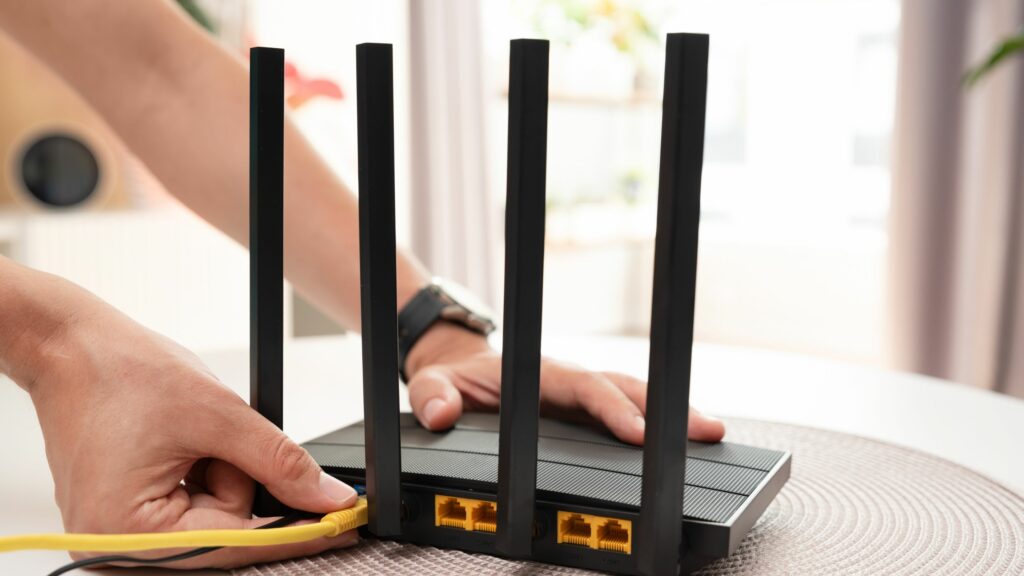In an age where the internet has become a linchpin of everyday life, selecting the right broadband plan is pivotal. The options can seem endless, with a jungle of jargon to navigate. This article is your flashlight, cutting through the confusion to find the perfect match for your digital needs.
The decision goes far beyond price, from assessing your current usage to predicting future demands. It’s about understanding how your online behaviour shapes your broadband requirements. We’re here to guide you through the critical factors influencing your choice.
We will explore broadband connections, analyze providers, and dissect contract details. By the end, you’ll be equipped to choose a service and tailor it to the rhythms of your digital life. Welcome to the starting line of your journey toward optimized home internet.
Factors to Consider
When Choosing a Broadband Plan
When selecting a broadband plan in the UK, several factors are crucial to consider:
Upfront Cost
This includes installation fees and the price of necessary equipment.
Broadband Provider
Different providers, like Virgin Media, offer varying service levels and deals.
Average Speed
Assess the average download speeds, which are critical for streaming or online gaming.
Monthly Price
Determine the ongoing cost of the service.
Contract Length
Common durations are 12 and 24-month contracts; mid-contract exits could incur fees.
Broadband Package
Look for inclusive offerings like unlimited downloads, often found in broadband-only deals.
Current Provider
Check if switching offers a better broadband deal or if staying avoids an exit fee.
Time of Day
Internet speed can fluctuate with usage patterns, so consider when you’ll be online the most.
Extras
Some plans include phone deals or other bundles.
What is Broadband?
Broadband internet is an indispensable technology that is the backbone of modern digital communication. This high-speed internet access vastly improves the older, slower dial-up connections, facilitating seamless and uninterrupted online experiences.
In the UK, broadband can be delivered through various methods, each with unique advantages tailored to different needs and environments. Digital Subscriber Line (DSL) is one of the more traditional forms of broadband, utilising existing telephone lines to provide internet access. This allows internet use without disrupting telephone service, making it a practical choice for many households.
Cable broadband, which operates over cable television networks, generally offers faster speeds than DSL. It is particularly effective in urban areas where the infrastructure is already in place. However, users may experience slower speeds during peak times due to congestion in the network.
The fastest and most reliable form of broadband is delivered via fibre-optic technology. This method uses cables made from thin glass or plastic fibre strands that transmit data as light pulses. The speed and efficiency of fibre-optic broadband make it ideal for high-demand users who stream high-definition videos, play online games, or download large files.
Wireless broadband is another option for connecting devices to the Internet using radio waves. This can be through fixed wireless points or mobile broadband that utilises the cellular network infrastructure. It’s a flexible solution that can be used on the move and continually improves speed and reliability.

How to pick the best broadband deal
Selecting the best broadband deal involves more than just finding the lowest price. It’s important to understand how providers adjust their pricing—some offer fixed rates throughout your contract term, while many will increase charges based on inflation plus an additional 3-3.9% annually. Our reviews detail the pricing strategies of various providers, and our comparison tool highlights potential future price increases in each plan.
Additionally, you should consider other essential factors such as customer support, internet speed, and service reliability. Our comprehensive surveys assess and score each provider based on these criteria. For an in-depth analysis, refer to our guide on top broadband providers to see how they compare.
Our featured deals table showcases a variety of reputable providers, each with an exclusive or standout offer. To explore a broader selection of packages that might be available in your area, simply input your postcode in the provided field above. This allows you to filter and compare options based on your specific preferences and needs.
 |  |  |  |  |
Vodafone | Virgin Media | Now BroadBand | Three 5G Hub | |
Average speed | 67Mb | 132Mb | 100Mb | 150Mb |
Price / Month | £26.00 p/m | £26.50 p/m | £24.00 p/m | £11.00 p/m |
Price / Year | HD voice sound | Full Duplex HD | HD voice sound | HD voice sound |
Setup Cost | Self-powered | Self-powered | Self-powered | - |
Understanding the Types of Broadband Connections
When exploring broadband in the UK, understanding the types of connections available is essential. The primary broadband technologies you may encounter include DSL (Digital Subscriber Line), Cable Internet, Fiber Optic, and Satellite Internet. Each type of broadband has unique features, benefits, and limitations that can influence your choice depending on your location, usage habits, and the broadband package on offer.
DSL (Digital Subscriber Line)
DSL is a type of broadband connection that utilizes existing telephone lines to provide internet access. It’s a widely available service and offers a variety of speeds suitable for everyday online activities, such as browsing and streaming. However, the quality of your connection and speed can be affected by your distance from the service provider’s local exchange or street cabinet.
| DSL Speeds | Use Case Scenario |
|---|---|
| Standard DSL (up to 24 Mbps) | Basic browsing, email |
| ADSL2+ (up to 24 Mbps) | Streaming, casual gaming |
| VDSL or Fibre-to-the-Cabinet (up to 80 Mbps) | HD streaming, online gaming |

Cable Internet
Cable Internet utilizes the same infrastructure as cable television networks. This type of broadband is known for providing faster speeds than DSL, making it a good choice for households with high bandwidth demands. Cable broadband is not as widely available as DSL, though, and your actual speed may be affected if the network becomes congested, particularly during peak usage times.
Fiber Optic
Fiber Optic broadband is the fastest type of broadband available in the UK, capable of delivering speeds well into the gigabits per second range. Unlike DSL and Cable, Fiber Optic connections transmit data through light signals along glass or plastic cables, ensuring minimal signal loss, thereby providing a very stable and reliable connection. There are different types of Fiber connections, such as Fiber to the Home (FTTH) or Fiber to the Cabinet (FTTC), with FTTH offering the highest speeds.
Satellite Internet
Satellite Internet is often considered a last resort for those in remote areas where other forms of broadband aren’t available. It uses satellite technology to beam internet from space to a dish installed at the user’s location. Although it covers wide areas that can’t be reached by traditional broadband, it tends to have higher latency and generally slower speeds compared to other types of broadband connections, plus the potential for signal interference due to weather conditions.
| Satellite Broadband | Typical Speeds | Considerations |
|---|---|---|
| Standard Service | up to 20 Mbps | Weather-related disruptions, higher latency |
| Premium Service | up to 30 Mbps | Higher monthly cost, installation fees |
As the broadband landscape continues to evolve in the UK, it’s important to stay informed about which type of connection works best for your specific needs, ensuring an optimal online experience whether you’re streaming, gaming, or working from home.
VoIP Infrastructure
In addition to choosing the right broadband connection, having a robust VoIP infrastructure is crucial, especially for businesses that rely heavily on communication. VoIP (Voice over Internet Protocol) enables voice calls over the internet, providing cost-effective and flexible communication solutions. A well-designed VoIP infrastructure can handle various broadband types efficiently, ensuring high-quality calls and minimal disruptions. This includes considerations for network bandwidth, security measures like encryption, and quality of service (QoS) protocols to prioritize voice traffic. Investing in a reliable VoIP infrastructure can significantly enhance the overall effectiveness of your broadband connection, whether for personal or business use.
Determining the Required Speeds for Specific Activities (e.g., streaming, online gaming)
Different online activities have distinct speed requirements. For instance:
- General browsing and email: 1-5 Mbps
- Social media: 1-10 Mbps
- HD streaming: 5-8 Mbps per device
- 4K streaming: 25-35 Mbps per device
- Online gaming: 3-6 Mbps for gaming, 0.5-1 Mbps for game console playing
- Video conferencing: 1-4 Mbps for high-quality video calls
Depending on your exact usage, you might need higher bandwidths to accommodate multiple activities simultaneously.
| Activity | Minimum Required Speed |
|---|---|
| Browsing/Email | 1-5 Mbps |
| Social Media | 1-10 Mbps |
| HD Streaming | 5-8 Mbps per device |
| 4K Streaming | 25-35 Mbps per device |
| Online Gaming | 3-6 Mbps |
| Video Calls | 1-4 Mbps |
Always consider opting for a slightly higher speed than the minimum to ensure a buffer for additional devices and unforeseen usage spikes.
Frequently Asked Questions
What is Broadband?
Broadband internet is a vital technology that significantly enhances traditional slow dial-up connections, providing seamless and uninterrupted online experiences. This high-speed access is essential for modern digital communication and is available in various forms such as DSL, cable, and fiber-optic technologies, each offering unique advantages for different user needs.
What should I consider when choosing a broadband plan?
When selecting a broadband plan, it’s crucial to evaluate several factors:
- Upfront Cost: This includes installation fees and the cost of necessary equipment.
- Broadband Provider: Different providers offer varying levels of service and deals.
- Average Speed: Essential for activities like streaming or online gaming.
- Monthly Price: Understand the ongoing costs.
- Contract Length: Typical contracts last 12 or 24 months; exiting early can incur fees.
- Broadband Package: Options like unlimited downloads are often found in broadband-only deals.
- Current Provider: Check whether switching providers offers a better deal.
- Time of Day: Internet speed can vary based on usage patterns throughout the day.
- Extras: Some plans include bundled phone deals or other bonuses.
How do I pick the best broadband deal?
Choosing the best broadband deal requires more than finding the lowest price. It’s important to understand how providers adjust their pricing—some offer fixed rates throughout your contract, while others may increase charges based on inflation plus an additional percentage annually. Consider factors like customer support, internet speed, and service reliability. Use our comparison tool and reviews to see how providers and their plans stack up against these criteria.
What are the types of broadband connections available?
Broadband connections in the UK include:
- DSL (Digital Subscriber Line): Uses existing telephone lines, widely available, suitable for everyday online activities.
- Cable Internet: Offers faster speeds than DSL, good for high-demand users but may experience slowdown during peak times.
- Fiber Optic: Delivers the fastest speeds and reliable connections, ideal for high-definition streaming and extensive online gaming.
- Satellite Internet: Best for remote areas, covers wide regions but may have higher latency and slower speeds.
What speeds do I need for activities like streaming or gaming?
The required speeds vary by activity:
- General browsing and emails: 1-5 Mbps
- Social media: 1-10 Mbps
- HD streaming: 5-8 Mbps per device
- 4K streaming: 25-35 Mbps per device
- Online gaming: 3-6 Mbps, plus additional bandwidth for console connectivity
- Video conferencing: 1-4 Mbps for high-quality video calls
Choosing speeds slightly above your needs can provide a cushion for multiple devices and unexpected usage increases, ensuring smooth and uninterrupted internet access.
Final Words
In the fast-paced world of digital connectivity, selecting the right broadband plan is essential for ensuring that your online activities—from streaming and gaming to browsing and emailing—are conducted smoothly and efficiently. The myriad of options, each with unique features and pricing models, means that making an informed choice is more crucial than ever. By understanding the various types of broadband available and the factors that influence their performance, you can tailor your internet service to perfectly match the demands of your digital lifestyle.
As we’ve explored the critical aspects of broadband selection, including the impact of speeds, provider reputations, and contract details, it’s clear that the best broadband deal isn’t necessarily the cheapest but the one that offers the most value for your specific needs. Whether you’re a heavy internet user looking for ultra-fast fiber-optic service or someone seeking a basic DSL connection, there’s a plan out there that’s right for you.
We encourage you to dive deeper into your options, use the tools and insights provided to compare different plans, and choose a broadband service that best fits your digital life. Have you had experiences, good or bad, with different broadband providers or plans? What are your top considerations when choosing a broadband service? Share your thoughts and questions in the comments below—let’s continue the conversation and help each other stay connected in the best possible way.


